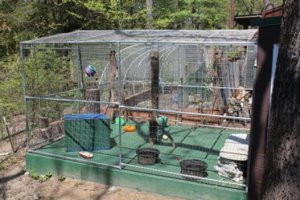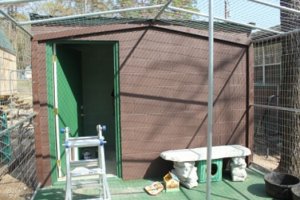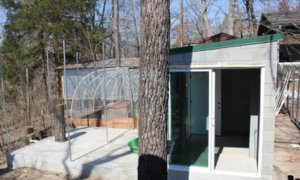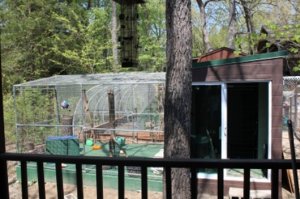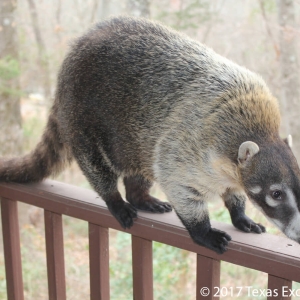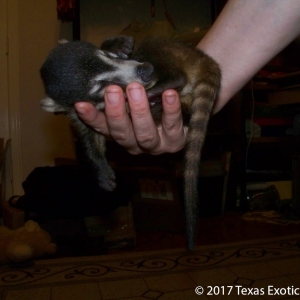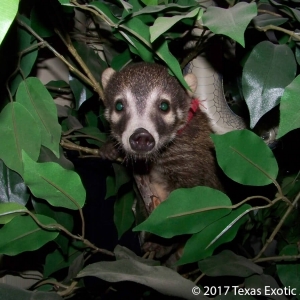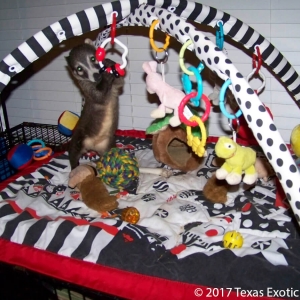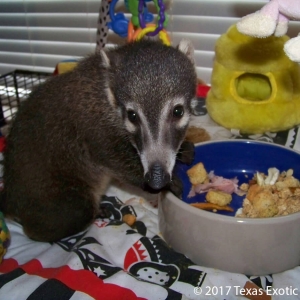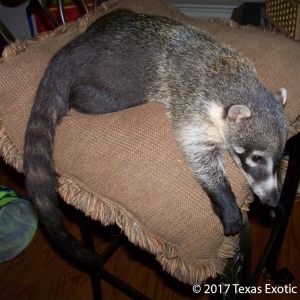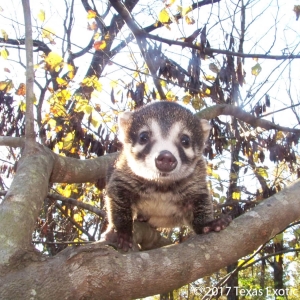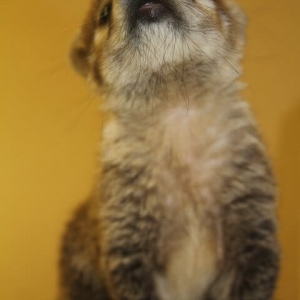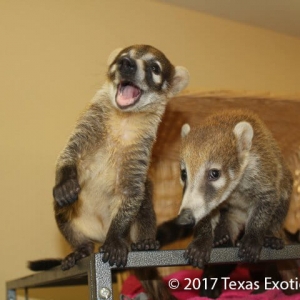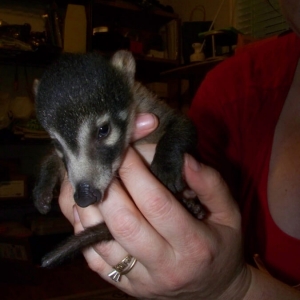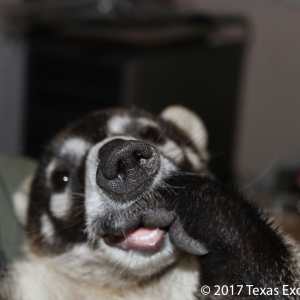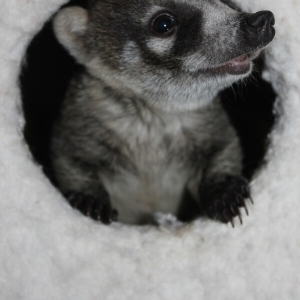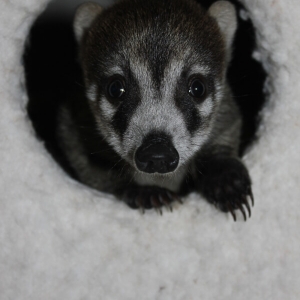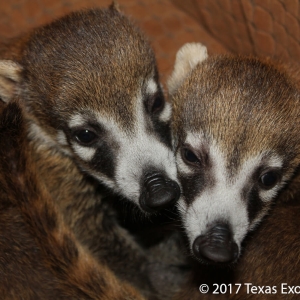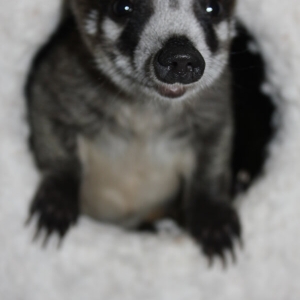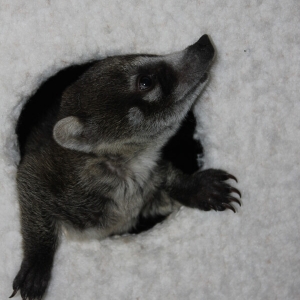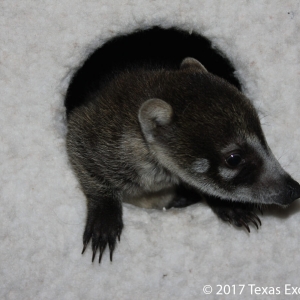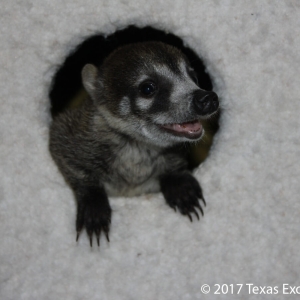WHITE-NOSED COATI
/koʊˌɑːtᵻˈmʌndi/
noun: white-nosed coati
plural: white-nosed coatis
What is a White-Nosed Coati?
The white-nosed coati (Nasuanarica), also known as coatimundi/koʊˌɑːtɨˈmʌndi/, is a species of coati and a member of the family Procyonidae . On average most weigh between 8 and 20 lbs. Males are larger. On average, the total length is about 3 ½ ft., about half of that being the tail length. A proper tail should make the sign of a question mark when coatis are active, playful and curious. In the USA, the white-nosed coati (Nasuanarica) is mainly found in the southeastern and southwestern corners of Arizona and New Mexico, and in parts of Texas. Relatives of the raccoon, the size of a big housecat, coatis have long tails, long noses and faces masked in white and black. They live in matriarchal bands of up to 40 animals and speak a language of grunts, chitters and churps. Babies make peeping sounds like baby birds. Another wonderful thing about them is they almost no odor or smell in their fur.
Kingdom: Animalia
Phylum: Chordata
Class: Mammalia
Order: Carnivora
Family: Procyonidae
Genus: Nasuella
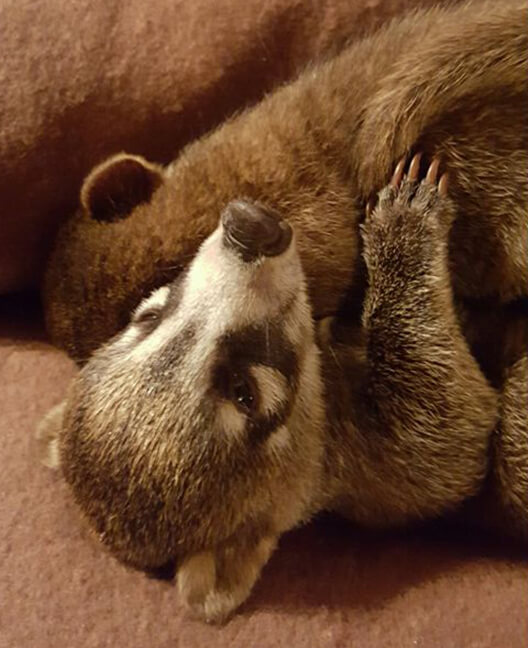
Interested in purchasing a White-Nosed Coati?
Please fill out our availability form and we will contact you directly.
Information for Texas Residents
The White-nosed coati is protected by Texas Parks and Wildlife. To legally keep one for a pet, you must purchase ONLY from a Texas Parks and Wildlife permitted breeder. This includes all colors variations and those hybrid mountain white-nosed coatis mixed. Texas Exotic Animals is one of the very few legal, permitted active breeders in Texas. You will receive proper documents when you purchase your baby from us. While the state of Texas is fine with people owning white-nosed coatis with proper paperwork, possession of an undocumented white-nosed coati can result in hefty fines as well as state-seizure and loss of any or all animals on your property.
Common questions about White-Nosed Coatis
Dark brown: The Dark Brown Coati is medium brown to black with a white mask on the face. This is the most common.
Red Coati: The Red Coati, which has a very auburn to reddish brown color with a white masked face. Often most of the Dark Brown Coatis can also have a slight red tint to them.
Blonde Coati: The very rare Blonde White-Nosed Coati which has blonde fur with a white masked face.
The last two and rarest of them all are the Albino Coati or Leucistic Coati which are all white with red or black eyes. We don’t have any and if you find some, please call me as I am interested in buying them myself.
What kind of house do you want for your Coati?
Let me start by saying this is one of those controversial topics. I am going to tell you what type of enclosures my Coatis live in and why. I will mention several options. One very important thing to remember is that not all situations are suitable for every home. You must consider when choosing an enclosure to consider things like your experience raising Coatis and available space and safety for your coati inside and outside. I will try and give you the pros and cons of both and many different situations. I am writing this as a guide, not the only solutions. Every home is different. Safety first is always my number one rule.

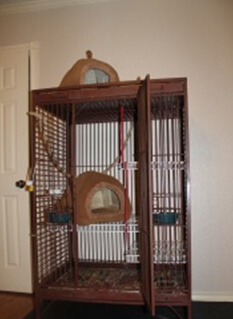 If you want just one (good luck on that as they become addicting). I have never had only one Coati so I don’t talk from experience, but this is a safe option in my opinion. Keep them in a large macaw cage or one of those extra-large Great Dane cages if you are on a budget. The large macaw cages run an average of $400 to $700. This will allow the Coati to climb up and you can install a hammock for them to sleep in. I also recommend installing wire shelves, not wood or anything solid. Shelves will allow your Coati some exercise and any excrement to fall to the bottom of the cage. Make sure to get a cage with a tall wire grate on the bottom. Coatis get bored or try to retrieve fallen food items and will rip the poo papers from the bottom tray ( messy). You can raise the bottom of any cage by zip tying wire shelf racks cut to fit the cage floor.
If you want just one (good luck on that as they become addicting). I have never had only one Coati so I don’t talk from experience, but this is a safe option in my opinion. Keep them in a large macaw cage or one of those extra-large Great Dane cages if you are on a budget. The large macaw cages run an average of $400 to $700. This will allow the Coati to climb up and you can install a hammock for them to sleep in. I also recommend installing wire shelves, not wood or anything solid. Shelves will allow your Coati some exercise and any excrement to fall to the bottom of the cage. Make sure to get a cage with a tall wire grate on the bottom. Coatis get bored or try to retrieve fallen food items and will rip the poo papers from the bottom tray ( messy). You can raise the bottom of any cage by zip tying wire shelf racks cut to fit the cage floor.
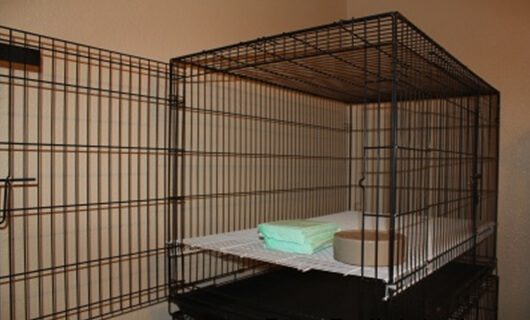
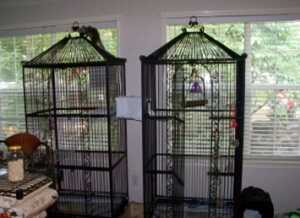 This is how it all began for us! After our little bottle babies grew enough to climb and run. We bought two nice but second-hand matching Macaw cages. My crafty other half made a pass through tunnel and connected the two cages together. This is a wonderful idea for one or two coatis. It really gives them plenty of play room and the best part…..We put a closing shift-door on the tunnel. This allowed us to do a quick clean or feed without letting our little imps out on the loose while we did our clean up. It comes in handy! Trust me, they will try to “help” you with any project you do, so a two minute clean up or feed can end up an hour-long project. Again; install some wire shelves and a few toys and you won’t feel guilty going to work or leaving your babies alone for a few hours.
This is how it all began for us! After our little bottle babies grew enough to climb and run. We bought two nice but second-hand matching Macaw cages. My crafty other half made a pass through tunnel and connected the two cages together. This is a wonderful idea for one or two coatis. It really gives them plenty of play room and the best part…..We put a closing shift-door on the tunnel. This allowed us to do a quick clean or feed without letting our little imps out on the loose while we did our clean up. It comes in handy! Trust me, they will try to “help” you with any project you do, so a two minute clean up or feed can end up an hour-long project. Again; install some wire shelves and a few toys and you won’t feel guilty going to work or leaving your babies alone for a few hours.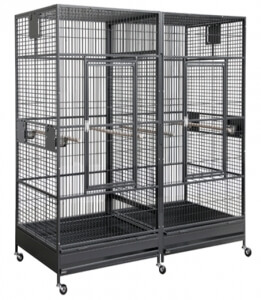 Now that you have become one of us, welcome to the fanatical Coati-owners family! You must say to yourself “I am a Coati addict” and own it… work with it. Don’t let me see you on one of those animal hoarding shows…All jokes aside; you will probably be looking at building custom enclosures. If you are not “Handy Dan” or a welder, let me recommend this cage. I currently own a few of them. It is called the Big Kahuna! It is manufactured by A&E Cage Co.. Many distributors sell them. Price ranges from $800 to $900 depending on who is having a sale. This is a very large cage, made for inside use and you need space. It has a built-in divider wall that is removable and trap doors you can build off of. This cage is too tall and wide to get through most doors assembled. Seriously, assemble it in the room you want it to live in. It has lots of space to install shelves and other toys, and even a swing and hammock.That is wonderful for the Coatis but makes clean-up a little more work. It cost more but, if you can afford it, get the stainless steel version. Up to four Coatis can live comfortable in this with added playtime outside.
Now that you have become one of us, welcome to the fanatical Coati-owners family! You must say to yourself “I am a Coati addict” and own it… work with it. Don’t let me see you on one of those animal hoarding shows…All jokes aside; you will probably be looking at building custom enclosures. If you are not “Handy Dan” or a welder, let me recommend this cage. I currently own a few of them. It is called the Big Kahuna! It is manufactured by A&E Cage Co.. Many distributors sell them. Price ranges from $800 to $900 depending on who is having a sale. This is a very large cage, made for inside use and you need space. It has a built-in divider wall that is removable and trap doors you can build off of. This cage is too tall and wide to get through most doors assembled. Seriously, assemble it in the room you want it to live in. It has lots of space to install shelves and other toys, and even a swing and hammock.That is wonderful for the Coatis but makes clean-up a little more work. It cost more but, if you can afford it, get the stainless steel version. Up to four Coatis can live comfortable in this with added playtime outside.